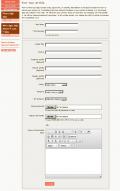
Lining up good references is crucial. No matter how qualified you may appear legal hiring managers know that your past performance is probably the best indicator for the future, and want to hear someone vouch for you.
For law students entering the workplace, the process of identifying, asking for, and providing references can be unfamiliar and daunting. Fear not--take our advice on who, when, and what to ask when securing references, and you'll be hearing "welcome aboard" in no time.
1. Decide who to ask
This can be the hardest part of gathering references-deciding who can provide the most fitting recommendation for a specific position. This should be someone you've had a professional relationship with-not just a personal one. Your best bet is to ask former law professors, school advisors, legal supervisors, coaches, extracurricular supervisors, or internship directors. A good reference should be able to attest to qualities that make a good employee, such as being responsible, professional, and having a positive attitude. Ideally, a reference should also be able to speak directly to the skills relevant for the position you're seeking.
2. Prep work
Do yourself a favor and line up references in advance. For instance, during the final week of an internship (perhaps during an exit interview), ask your legal supervisor whether you can use him as a reference in the future. That is, if the internship went well. Then, once you start to interview for jobs down the road, you know who to call on.
3. Keeping in Touch
Perhaps the most important part of having good references to speak on your behalf is staying in touch with them. Your reference may switch jobs or change his email address or phone number, and forget to tell you. By checking in, you'll stay on their radar and his assessment of your abilities will stay fresh in his mind. Email is, of course, a reliable stand-by for sending updates a few times a year, but LinkedIn is also a great way to keep track of your reference and up-to-date contact information.
4. Asking for the Reference
When you ask for a reference, simply say, "Would you mind if I provide your name as a reference for a few positions I'm interviewing for?" If your contact agrees, follow up by asking for the email and phone number where he can be contacted. Some references givers may prefer you use their personal email and phone. If you need a recommendation and you haven't lined up references in advance, realize you may be putting your reference on the spot. Be mindful that your request is short notice, and leave an opportunity to say "no." "That way, your reference has an easy out if they are not comfortable," says Alison Doyle, job search expert for About.com.
5. Keep Them Informed
Let your reference know once you've given out his name who specifically will be contacting them. You should brief your reference on the job you applied for and offer to provide a resume. "Make it as easy as possible for the reference," says Doyle. "You should give them the name of the person who will contacting them, the position you applied for, and the company name." It's also useful if you bring your reference up to speed on the skills you'll be using on the job, so they can tailor their recommendation to those talking points. For example, if the position you're interviewing for is in public relations, you could ask a former professor to speak about your people skills, writing ability, and knack for public speaking.
6. What to provide your interviewer
In most cases, providing names, email addresses, and explaining your relationship with each reference will suffice. Your interviewer will then contact the reference via email or phone. Another great source for obtaining references is LinkedIn.com. If you have several letters of reference on your LinkedIn profile from former colleagues or professors, you can ask your interviewer if LinkedIn is an acceptable means of receiving references-although be aware you'll get more personalized references through a phone call or email.
7. When to provide it
There's no need to brandish your references until you're asked. "Employers only check with references when they're down to making a final hiring decision," says Doyle. There's also no need to list them on your resume, or to add that famous footnote, "References available upon request."



